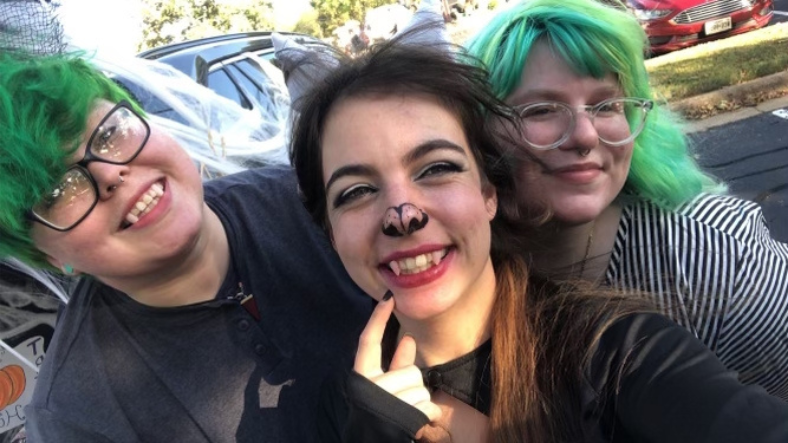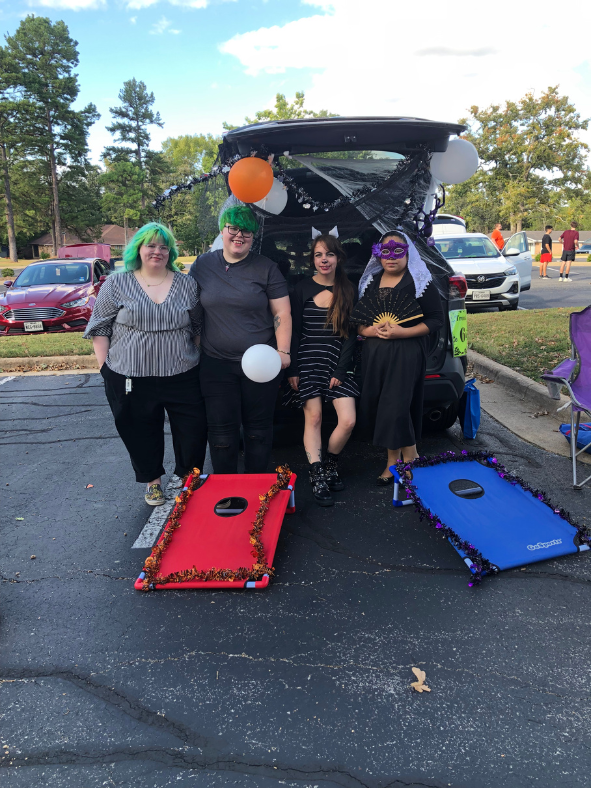Jane: My guest today is Cheyenne Lortz. Cheyenne is a 25-year-old social work major, graduating spring of 2024 with UT Tyler’s first social work program’s graduating class.
Cheyenne has lived all over East Texas and calls Tyler home. She loves painting and live concerts, especially older punk rock. She’s the proud parent of twin boys who will be four years old in July. Welcome, Cheyenne.
Cheyenne: Thank you. It’s really nice to be here with you.
Jane: What drew you to the social work program and this, and particularly the one at UT Tyler?
Cheyenne: Honestly, what really drew me into this program has a lot to do with my history growing up here. There’s a lot of systems that I’ve seen firsthand that I feel like could really use some adjusting and some going over here in Tyler and across the state and across the country. There’s a lot of things that people look over very easily that has such an impact on large masses of our populations, and a lot of these issues can be fixed with some policy tweaking, especially from people who work at the ground level and know how people are really affected by the decisions that people are making higher up.
So, that kind of pulled me into social work, learning that you can w-rk on a macro scale to make those kinds of changes to help the community as a whole.

UT Tyler’s Social Work Club at a Trunk or Treat benefitting the East Texas Crisis Center. 📷 photos courtesy Cheyenne Lortz
Jane: Tell us things you’ve participated in and engaged with that have been especially impactful for you.
Cheyenne: I’ve really enjoyed a lot of our events and a lot of our community work, but what has impacted me the most was working with Tyler’s homeless population, especially with Hunger for Love. Essentially it’s a program and a group. They work with a church and they get a lot of assistance from the street team as well, which is another organization here in Tyler that work with the homeless.
They do hot breakfasts and lunches. There are other groups of people that will also help with clothing.
I’ve worked with street team too, actually. I’ve really enjoyed meeting some of those people, having those opportunities. It’s really eye-opening and humanizing to the people that we have who are living in Tyler without a home — just talking to them and hearing their stories and how they’re people just like everyone else. It’s eye-opening to how quickly we can find ourselves in a hard position.
Jane: So, going back to something you said at the top about systems that could have some tweaking to make these big changes: what do you imagine would be some tweaking that could be done for the homeless population in our area?
Cheyenne: We do a yearly PIT count, and the idea of the PIT count is to get an idea on how large our homeless population is. They use that count to distribute funding. But, we do this count in the middle of winter. A lot of them have to keep moving in the winter, so it’s incredibly hard to find and count them.
So, the statistics we have on Texas’ homeless population is inaccurate because of the time that we do the PIT count. I think it’d be better to do it in the spring, so that we would know how many resources we actually need and handle the problem based off of that number.
Our homeless shelters have a lot of guidelines and restrictions on them. Some of the ones I know have been a problem for people here in Tyler is on really cold days and really hot days. They’ll open up the emergency shelters for homeless people to take shelter from that, but they don’t do it when it’s raining and flooding.
So, we have a lot of people that will lose what belongings they do have to the rain, or they’ll be staying in the woods and it washes away their camps or makes them really sick.
I also think East Texas mental health isn’t really at its best. Texas ranks very low in mental health standards.
Jane: You mentioned at the beginning social work for you was not only an outside academic interest, but this also is very autobiographical for you.
Do you care to share anything about where those two meet? I’m basically asking you what’s your “why.”

Cheyenne: I do have a why story. I grew up in a broken home that had a lot of addictions in it and some problems with domestic violence. I’ve seen how those systems work through families. I’ve seen how the criminal justice system affects people coming in and out and poverty.
And honestly, I come from a place where we were taught not to trust social workers or a lot of people. And then, I had my children, so I began breaking a lot of the cycles that I had grown up in and seen in hopes of doing better for my own family.
I started school. I actually started school as a psychology major, but I was in a federal government class when someone pulled me to the side and started telling me about social work, about how diverse it was. I wanted to try to help other people break these same cycles on a large scale.
Jane: Cheyenne, if you could be the social worker coming into your life at a younger time in your family and its systems and its history, what do you wish that social worker could have been or done?
Cheyenne: Maybe a little bit more patient to gain my trust. I think that’s a hard one, building rapport, and they might not just necessarily jump to take your hand. Even if you are in this professional role to develop that trust, someone’s going to have to see you as fully human. I think that’s where some of the importance of self-disclosure comes from, of course, with an appropriate boundary and line.
People tend to trust you more if they realize that you actually understand and you’re not just a person in a business suit or pencil skirt sitting in front of them.
Jane: What is your hope for Tyler and East Texas as social work hopefully grows and expands?
Cheyenne: I hope that some of the systems here can be fixed to be more accepting and more understanding of the LGBTQ community; to be more accepting and understanding of the homeless community; and understanding the struggles and how easily it can be to find yourself in that position.
I’m hoping that we could get better rehabilitation facilities and more mental health assistance, especially here in Tyler.
Jane: Is there anything that hasn’t come up yet that you want to address? Anything that you wish people knew or understood?
Cheyenne: If there was something I would really like more people to know about social workers, it’s honestly a misunderstanding that even I had when I was younger and already in college, before I had started the social work program.
There’s a lot of stigma behind social workers that if you’re honest with them, or if they come into your lives, that you’ll lose your children or you’ll get in trouble because you’re struggling with addiction and the law could get involved.
At its core, the idea and hope and the goal of the social worker isn’t to come and take things away from you or to get you in trouble, but to help you find the resources and guide you down paths that can help you get to the places where you want to be and to make things better for yourself and your family.
It’s not as scary as it may seem whenever these other stigmas fade away.
Jane: Some people talk about the pathway to change as policy. I hear another branch of people who say this is really about hearts and minds: get to know somebody, sit down with them, have a cup of coffee with them.
Is there a sweet spot where those come together or is there one that feels to you more important or more change-making?
Cheyenne: I definitely feel like it is the combination of both sitting down with that cup of coffee or tea and having that conversation to really understand where they are coming from as a person: it’s what ignites people to be interested in making large policy changes.
The problem has to be humanized for people to get involved, and once that involvement takes place, you can do more changes, because you need people putting out the word. You need people working for it. You need voting. You need those active changes to be made but to inspire people to do that, it has to come to heart first.
Jane: I’m also thinking of sort of this third way. When you show up as a social worker who has also had this experience with social workers from your younger life and you’ve been able to heal those parts of yourself, how much impact does that have on the work you’re doing now?
Cheyenne: I feel like it will have an extreme impact. I can’t say even now that some days don’t get hard, but something that I’ve definitely turned to that I feel like I will hopefully be able to have people also turn to is even if you’ve come from somewhere that’s so hard, as long as you look at the progress that you’re making, you’ll feel a little better.
Jane: Cheyenne Lortz, it’s been a delight to have you. Thank you for sharing with The Tyler Loop.
Cheyenne: Thank you.
Love what you're seeing in our posts? Help power our local, nonprofit journalism platform — from in-depth reads, to freelance training, to COVID Stories videos, to intimate portraits of East Texans through storytelling.
Our readers have told us they want to better understand this place we all call home, from Tyler's north-south divide to our city's changing demographics. What systemic issues need attention? What are are greatest concerns and hopes? What matters most to Tylerites and East Texans?
Help us create more informed, more connected, more engaged Tyler. Help us continue providing no paywall, free access posts. Become a member today. Your $15/month contribution drives our work.







